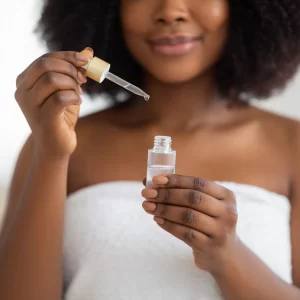
Hyperpigmentation Treatment For Dark Skin
Hyperpigmentation treatment for dark skin. Hyperpigmentation is a skin condition that affects all skin tones.
Those with medium to dark skin tones get dark spots and patches because their skin makes extra melanin.
Many everyday things can trigger excess melanin in people who have darker skin tones.
These patches can be caused by acne, skin picking, sun damage, hormones, trauma skin, and certain medications.
Breaking It Down:
Sun exposure: Excessive exposure to UV radiation can cause dark spots, Melasma, and further skin pigment issues.
Hormonal changes: Melanin production is sometimes caused by hormones, such as during pregnancy or when taking birth control pills.
Hormonal issues can cause extra dark pigment on women’s face, neck area, armpits, inner thigh area, and as well as, the vaginal area.
A Dual Therapy Of Chemical Peel Safe For Dark Skin And Lightening Cream Will Fade Hyperpigmentation Fast
Inflammation: Post-inflammatory hyperpigmentation can occur when acne heals, leaving dark spots behind.
Excess melanin is produced after skin trauma, resulting in postinflammatory hyperpigmentation.

Medications: Certain medications can cause hyperpigmentation as a side effect.
Indeed, sun protection is essential if taking medications to prevent pigment from getting worse.
The medication induced pigment will usually resolve over time once you stop taking it.
Genetic factors: Some hyperpigmentation can be inherited from family members.
For dark skin hyperpigmentation, there are several treatment options.
Some Commonly Used Treatment options:
Laser therapy: Laser treatments, such as pulsed dye laser or Q-switched laser, target melanin in the skin and break it down, leading to reduced hyperpigmentation.
It’s vital to see a doctor who treats dark skin. Especially if deciding to do laser therapy to treat your hyperpigmentation.
A Spot A Few Shades Darker Than Your Natural Skin Color Will Fade Within 6 to 12 Months
Chemical peels: Chemical peels that use glycolic acid, kojic acid, azelaic acid, vitamin C, Hydroquinone, kojic acid, and citric acid are best when treating hyperpigmentation on dark skin.
Hydroquinone: Hydroquinone is a skin bleach that controls melanin production.
It’s important to know not to use large amounts of Hydroquinone. 4% is ideal.
Vitamin C serum: Vitamin C is a potent vitamin that helps lighten the skin and, thus, anti-aging.
A vitamin C serum will help even skin tone and reduce hyperpigmentation.
Ensure your vitamin C serum is at least 15% or higher in concentration.
Thus, vitamin C serum would lighten hyperpigmentation faster with other pigment-lightening ingredients.
Skin-lightening creams: Retinol, kojic acids, azelaic acids, tranexamic acids, cysteamine, and mulberry extract will reduce dark spots and hyperpigmentation.
Avoiding Hyperpigmentation Triggers
Avoiding triggers like sunlight or hormonal changes can help prevent or reduce hyperpigmentation in dark skin.
Indeed, you should consult a skin professional to develop the right treatment plan for your hyperpigmentation.
Treating your hyperpigmentation at home is possible if you follow a natural skin protocol that includes:
- Mild face wash
- A natural toner
- Vitamin C serum
- Lightening fading cream
- Most importantly, zinc oxide SPF
- At-home chemical peel treatments
Treatment for dark skin hyperpigmentation requires time and patience.
You can improve dark skin’s hyperpigmentation with care for a clear and smoother appearance.

Article On Fading Dark Spots On Dark Skin

